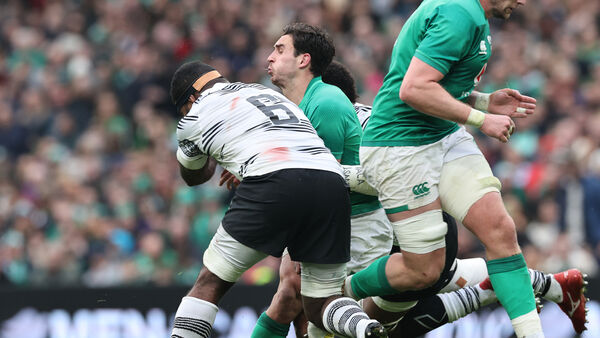A November test against Fiji is unlikely to get Irish hearts racing at the best of times, let alone when it follows a thrilling victory over the reigning world champions a week earlier and features a second string side.
While Kalaveti Ravouvou’s magnificent try in the fourth minute last Saturday gave us some hope the game would be a close contest, it quickly became what was predicted — a pedestrian, underwhelming and rather forgettable Irish victory.
The lack of atmosphere in the Aviva was palpable and you could hear the chatter of thousands of conversations all afternoon, like the canned background noise in the Rover’s Return from an episode of Coronation Street. While expected, this gave weight to suggestions from some quarters that games of this nature could do with being moved to different locations around the country in future, following the success of Munster’s visit to Páirc Uí Chaoimh on Thursday night.
As is often the case these days, one of the main flashpoints of the game was a red card, and Joey Carbery was lucky not to end up with a broken jaw or windpipe following Arthur Tuisue’s late, high, no-arm shot on him in the 46th minute. In fact, you could say that red cards, the laws and their interpretation by referees were the main talking points to come out of the weekend’s rugby once again.
That there were three red cards for dangerous play is both a good and a bad thing. Good, in that every incident that warranted a red card saw one produced. Bad, in that the message is still not getting through to players, coaches and supporters alike. The issue of concussion has put rugby in the firing line for some time and there is a general acceptance that the next few years are a period of reckoning for the sport at elite level.
When people ask what more World Rugby can do to make the sport safer, the lowest hanging fruit is for a real zero-tolerance policy to be implemented around contact to the head and dangerous play. While this already exists in theory, the level of discretion referees can use and the number of mitigating factors that can be applied to reduce the on-field sanction mean there is still a lot of inconsistency in how it is applied.
The game needs to get to a place where any contact to the head or neck, or any action that puts an opponent’s head or neck at risk (like a tip tackle or taking a man out in the air), results in an automatic red card and a hefty ban. This needs to happen regardless of intent, and regardless of how hurt the player on the receiving end is. Ultimately, if players still back themselves to dance on the line of what is legal and what is not in the knowledge they might get away with it, their behaviour will be very slow to change.
It was encouraging to see referees Matthieu Raynal and Wayne Barnes adopt a swift, no-nonsense approach to the incidents at the weekend. Pieter-Steph du Toit was a bit unlucky to hit Jonathan Danty the way he did and fracture his eye socket. Du Toit’s teammate Kwagga Smith inexplicably threw him towards the breakdown and this could have been considered a mitigating factor by another referee.
Nonetheless, du Toit and Damien de Allende were both shaping to hit Danty who, while on the wrong side of the ruck, was not a threat to the ball and was not in a position to protect himself. While the final action may have been worse than intended, du Toit put himself at risk of doing something dangerous and paid the price for getting it wrong. He didn’t mean to hit his head but that is irrelevant, and it should always be irrelevant.
It was a similar story when Antoine Dupont was sent to the line for taking out Cheslin Kolbe in the air, causing him to land dangerously on his head and neck and forcing him off for a HIA (which he failed). Dupont had his eyes on the ball and his arms outstretched to try and gather it. Some would argue this is a mitigating factor. As with du Toit’s clear-out, the reality is that if you put yourself in a position where this can occur, you have made your bed; when things go wrong, you must lie in it. A lack of intent to hurt should never be enough to avoid a red card.
Sadly, some coaches still have to be convinced. Fiji boss Vern Cotter managed to keep a straight face when arguing that Tuisue did not deserve to be sent off, despite ticking literally every box on the checklist for what constitutes a red card offence. Elsewhere, England women’s coach Simon Middleton claimed winger Lydia Thompson did not deserve to be sent off in the 18th minute of Saturday’s thrilling World Cup final.
This is despite the fact that Thompson smashed heads with Black Ferns winger Portia Woodman in a fully upright position, as she came from 20 metres away to tackle her on the touchline. Woodman was knocked out cold. She missed the rest of the game. Middleton says a 20-minute ‘orange card’ would be more appropriate in such cases. The mind boggles.
Cotter and Middleton weren’t the only coaches with bad takes in the aftermath of a loss over the weekend. Rassie Erasmus was up to his old tricks, tweeting a barrage of videos, accompanied by sarcastic text, highlighting apparent inconsistencies from the officials on Saturday evening. While a couple of the grievances are legitimate, most of them actually show the on-field decision was correct and merely cement the impression most level-headed people have that this carry-on is just bitterness in defeat on a level we have never seen before.
While the hour-long diatribe against Nic Berry after the first Lions test last year was a low point in rugby discourse, at least you could see what the goal was. He was trying to force an immediate reaction for the remaining games and, based on what happened, you could argue the gamble was a success, despite ultimately receiving a ban from all rugby activity as a consequence.
Now, it looks like a deliberate attempt to undermine the entire officiating system and paint the Springboks as the perennial victims of a coordinated plot to unseat them from their throne.
London-based South African rugby writer (and massive Boks fan) AP Cronje put it well on Twitter when he said, “As a comms strategy it is hugely flawed and ineffective. Fundamentally it’s just not working. So pack it in.”
It’s probably the best advice that anyone could give.

